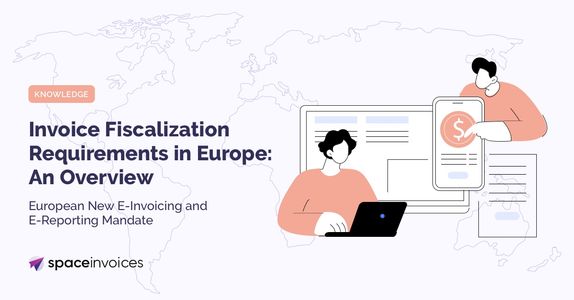Invoice Fiscalization Requirements in Europe: An Overview
In this article, we will provide an overview of fiscalization in Europe, focusing on the specific requirements and obligations imposed on companies.
Invoice fiscalization is a critical component of modern business operations, particularly for companies operating in Europe. It involves the integration of technology and legal frameworks to ensure compliance with tax regulations, combat tax evasion, and enhance transparency in financial transactions. In this article, we will provide an overview of fiscalization in Europe, focusing on the specific requirements and obligations imposed on companies, with an emphasis on the B2B Software-as-a-Service (SaaS) industry and the opportunities to automate the fiscalization process by using APIs for invoicing fiscalization compliance.
Fiscalization Objectives
Fiscalization is a strategic approach that governments employ to achieve multiple objectives, benefiting both tax authorities and businesses. By implementing robust fiscalization systems, governments aim to:
Enhance Tax Compliance:
Combat Tax Fraud:
Improve Transparency:
Accurate Financial Reporting:
Streamlined Tax Collection:
Simplified Compliance Procedures:

Country-Specific Requirements
While there are overarching principles and guidelines established by the European Union (EU), individual countries within Europe have their own specific fiscalization requirements. It is crucial for companies operating across borders to be aware of these variations to ensure compliance in each jurisdiction.
Here, we highlight a few examples. For a more comprehensive overview of fiscalization requirements on a country-by-contry basis, refer to this helpful guide provided by Space Invoices, a company that provides an API that automates the fiscalization process for software organizations. The list can be found here.
Germany:
In Germany, invoice fiscalization is primarily governed by the GoBD (Principles for Proper Management and Storage of Books, Records, and Documents in Electronic Form). B2B SaaS companies must adhere to these principles, which include requirements for secure storage, integrity, and auditability of electronic documents.
France:
France enforces invoice fiscalization through the SER (Recording System for Receipts). B2B SaaS companies are obligated to maintain reliable and certified systems that record sales, invoice details, customer information, and transaction amounts, which must be made available for review by tax authorities.
Spain:
For invoice fiscalization, Spain employs the SII (Immediate Supply of Information) system, requiring B2B SaaS companies to submit detailed transactional data to the tax administration in near real-time. This includes invoices, customer data, and associated tax rates.
Slovenia:
In Slovenia, fiscalization requirements mandate that businesses, including B2B SaaS companies, issue electronic invoices in a structured format through the "eDavki" system. These invoices must be electronically transmitted to the tax authorities for validation and storage. For more information on fiscalization requirements in Slovenia, see this post.
Croatia:
In Croatia, invoice fiscalization requirements oblige businesses, including B2B SaaS companies, to use the "Jedinstveni Informacijski Sustav Porezne Uprave" (JIRP) or "Single Information System of the Tax Administration" for electronic invoicing. B2B SaaS companies must ensure that their invoices are issued in a structured format and sent to the tax authorities for validation and archiving. For more information on fiscalization requirements in Croatia, see this post.
Italy:
In Italy, invoice fiscalization requirements revolve around the "Sistema di Interscambio" (SDI), an electronic invoicing system. B2B SaaS companies are obligated to issue electronic invoices through the SDI, ensuring compliance with specific technical standards and submitting invoices to the tax authorities for verification. For more information on fiscalization requirements in Italy, see this post.
Portugal:
In Portugal, invoice fiscalization requirements center around the "Fatura Eletrónica" system, which mandates B2B SaaS companies to issue electronic invoices in a standardized format. These invoices must be sent to the tax authorities for validation and archiving. For more information on fiscalization requirements in Portugal, see this post.

Solutions for Automating Invoice Fiscalization Compliance
To navigate the complexities of fiscalization, B2B SaaS companies can leverage API-based software solutions. These solutions offer automated features that streamline compliance processes, including:
Invoicing Compliance:
Real-time Data Exchange:
Validation and Verification:
Data Storage and Retrieval:
Stripe is a market leading payments company that includes some invoicing features. However, Stripe does not support fiscalization. A company that supports automated fiscalization with a unified API is called Space Invoices. Their solution can serve as just a fiscalization engine, or can also provide low-cost payment processing that is integrated with their fiscalized invoices.
The landscape of fiscalization and e-invoicing is continuously evolving. Some key trends to watch for in the future include:
Standardization:
Blockchain Technology:
Digitalization of VAT Compliance:

Conclusion
Invoice fiscalization requirements in Europe play a vital role in promoting tax compliance, combating tax fraud, and enhancing transparency. By understanding the specific requirements of each country and leveraging API-based solutions like Space Invoices, businesses can streamline compliance processes, generate compliant invoices, and ensure timely reporting. As fiscalization and e-invoicing continue to evolve, staying informed about future trends will be crucial for companies to adapt and thrive in the changing regulatory landscape.
Additional reading:
Start issuing Invoices, free!
Signup and start issuing compliant invoices from your software in minutes.
Or contact us to get a free implementation consultation.
